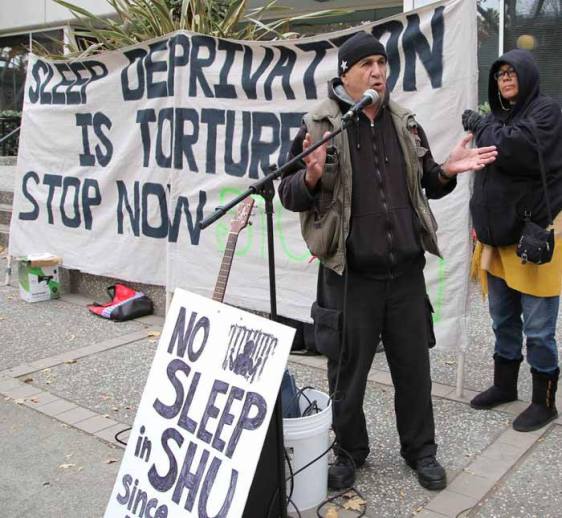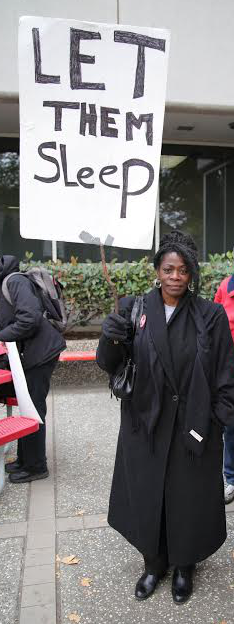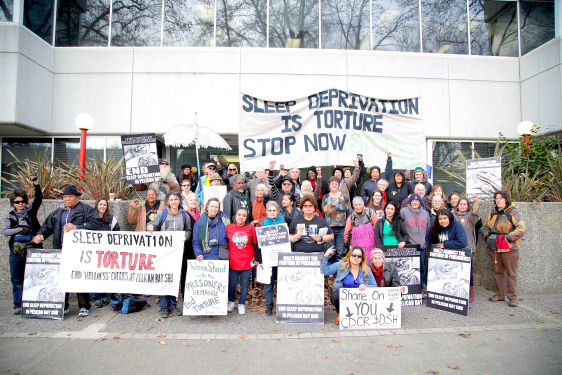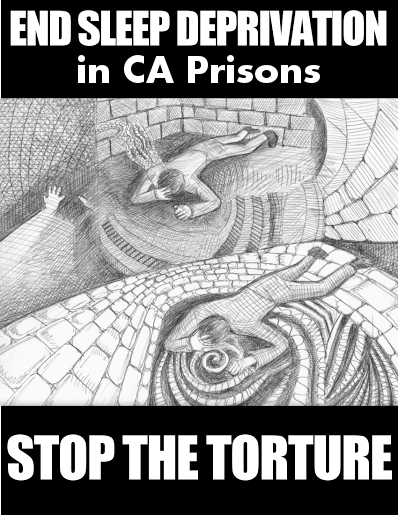Policy of the Cruel and Absurd: Sleep Deprivation in California’s Prisons
ANGLO AMERICA, 29 Jan 2018
10 Jan 2018 – In prison isolation units throughout California, guards wake prisoners up every 30 minutes under the guise of suicide prevention. These “security/welfare checks” cause ongoing sleep deprivation. The United Nations and many sleep and mental health experts have long defined sleep deprivation as a form of torture, and sleep deprivation often is used as a torture technique for prisoners of war. So California tortures its prisoners to prevent them from killing themselves.
Dr. Jamie Zeitzer, Ph.D., an expert in sleep and circadian rhythms, concluded in a 2015 report:
“The current practice of 30 minute … checks of inmates housed in the [Security Housing Units] is likely a cause of severe sleep disruption … The mandated purpose of these … checks (i.e. suicide prevention) is, in fact, likely to have the opposite effect and inadvertently increase suicidality in these individuals … There have been no direct studies of intentionally waking an individual every thirty minutes every night for days, weeks, or months, as doing so would be considered highly unethical in a research environment.”
Yet this is the reality for people housed in California’s Security Housing Units (SHUs), Administrative Segregation Units (Ad-Segs/ASUs), Condemned Units (death row) and Psychiatric Services Units (PSUs). In these solitary confinement cells, prisoners are kept alone 24 hours a day with no direct contact with other people — except guards. Known effects of such isolation include suicidal thoughts and behavior, yet the California Department of Corrections and Rehabilitation (CDCR) fails to provide adequate, if any, mental or physical health services. Instead, it keeps people locked up in brutally oppressive conditions, and jars them awake every 30 minutes, purportedly to see if they’ve committed suicide.
CDCR does not even acknowledge that prolonged isolation is torture and psychologically harmful. They use the “checks” as a blanket practice, whether or not prisoners are suicidal and despite the fact that sleep deprivation increases the risk of suicide. In CCWF death row, where the checks began in May 2014, there has not been a suicide since 1991 [pg 6 in link]; in Pelican Bay SHU where the checks began in August 2015, there has been one suicide in 13 years. Prisoners point out these histories as they question the purpose of the “checks.” These “checks” only exacerbate CDCR’s abuse of prisoners and historic refusal to compassionately treat prisoners dealing with serious mental health issues, including suicide.
“CO’s can save lives by talking to potentially suicidal inmates…”1 Good interpersonal communication skills by guards are consistently recommended to prevent suicides in prison, but such skills are rare in CA prisons. Admitting suicidal feelings to prison staff will, ironically, subject prisoners to the brutality of “suicide watch.” Prisoners report that guards use the “security/welfare checks” to be as loud and disturbing as possible.
Paradoxically, these so-called “security/welfare checks” come as the result of a settlement, theoretically a victory to improve the conditions of prisoners, in a federal class-action lawsuit, Coleman v. Governor of CA. The Coleman court determined that California prison officials did not provide adequate mental health care, thus violating prisoners’ Eighth Amendment protection from cruel and unusual punishment.
The judge appointed Matthew Lopes as Special Master to oversee CDCR’s implementation of Coleman reforms for 35,000 prisoners with serious mental illness, and Lopes brought in “suicide expert” Lindsay Hayes as a consultant. Just prior to becoming the “suicide expert” under the Coleman Special Master, Hayes worked as a consultant for the defendant — the California Department of Corrections and Rehabilitation itself. Hayes endorses the 30-minute checks.
Even as he receives letters from prisoners suffering from the checks and those who support the prisoners from the outside, he has not responded, or, to our knowledge, recommended a change.

The California State Auditor recently released a report on suicides in CA prisons commissioned by the Joint Audit Committee of the CA legislature (http://tinyurl.com/yca9tvf5.) While the report concludes that “It [CDCR] Must Increase Its Efforts to Prevent and Respond to Inmate Suicides,” it does not address prison conditions – like brutal and racist guards and administration, solitary confinement, and the horrific “suicide watch,” when prisoners considered suicidal are “allowed only a no-tear smock or gown, a safety mattress, and a no-tear blanket. All furniture is removed, [and] staff must provide continuous, direct visual observation as well as nursing checks every 15 minutes,” instead of any kind of humane and compassionate care.
A representative from the Auditor’s office had contacted our committee for input. We provided written descriptions of the “security/welfare checks”, documentation from prisoners in 13 prisons describing the checks as torture and explaining the harm to their mental and physical health, and material opposing the checks from 3 sleep experts and the American Public Health Association. Nevertheless, the audit completely ignored the input of our committee and all “advocacy groups,” and apparently the auditor did not seek any input at all from prisoners. The report has little mention of the “security/welfare checks,” except to say 2 of the 4 prisons the Auditor examined “did not conduct these checks as required.” The report refers frequently, however, to the “suicide expert,” and calls for his recommendations to be implemented, clearly indicating support for the “security/welfare checks”.
Other experts, however, have recommended the checks be halted:
“Repeated intrusions, especially to nightly sleep, lead to a variety of negative physical, cognitive and emotional consequences, adding to the already well-documented harms of solitary confinement.… There are other strategies for suicide prevention that can be pursued in prison contexts that do not result in the suffering caused by th[is] approach …” — Jail and Prison Health Committee, American Public Health Association
“This level of [interrupted] sleep has been shown to have profound effects on cognitive performance, memory, mood, immune function, pain sensitivity, metabolism, and other parameters.… Importantly these effects accumulate across time. Thus as these checks are done nightly their negative effects will become greater across time … There is much research on disturbed sleep in Intensive Care Units in hospitals. Checking on patients for their safety has resulted in many ill effects. Today there are many initiatives to overcome the negative effects of this safety monitoring.” — Dr. Thomas Roth, PhD Chief, Sleep Disorders and Research Center, Henry Ford Hospital
“A recent series of studies in Veterans has further pointed to the strong connection between suicidality and sleep, so much so that treatment of sleep problems in Veterans is considered part of the first line of treatment in reducing the risk of suicides.” — Dr. Jamie Zeitzer, PhD. Stanford University and the VA Palo Alto Health Care System
The “security/welfare checks” involve a system called Guard One, where an officer hits a metal pipe into a metal receiving hole in or next to the cell door to electronically register that a “check” has been done. Most guards rush through the checks, loudly banging the pipe once or twice at each cell. The unrelenting sound of the Guard One “metal on metal” strikes, the reverberating “booms” of steel unit doors opening and slamming shut, the noise from guards stomping through pods and up and down stairs, rattling their keys and chains, sometimes talking loudly to each other, and shining flashlights in prisoners’ faces at all hours create nightmarish conditions for the people in prisons who are forced to endure these “checks.” At the same time, prisoners report that the guards ignore their cries or requests for help with problems they are having, and may not even look inside the cell at all.

Sacramento, CA in front of California Department of Corrections and Rehabilitation (CDCR) headquarters. Nov 30, 2015 Emergency Protest of severe sleep deprivation in Pelican Bay SHU (solitary confinement) due to so-called “security/welfare checks” In solidarity and active struggle, Bato Talamantez, former San Quentin 6 prisoner, speaks about the sleep deprivation torture. Photo by: Lucas Guilkey
From Salinas Valley State Prison Ad-Seg: “[They] slam a metal rod into a metal plate on the cell door. You can hear the cop coming a mile away. Ba- Boom! Ba-Boom! And you cringe in anticipation because even though you know it’s coming, it is one of the loudest, most obnoxiously unpleasant sounds one could experience.”
From CSP-Sacramento PSU: “We literally — very literally — live inside of a steel drum that gets pounded 48 times a day. It just happened now and it startled me so bad I dropped my … pen. THIS is Torture!”
From Central CA Women’s Facility Condemned Units/death row: “Many of us have histories of seizures. Flashing lights, banging on doors and lack of sleep have caused some of us to go into seizures. Some of us have had to raise/change meds just to cope, because of the monitoring/banging/ beeping/flashlights. We’re surprised nobody’s has [had] a heart attack yet…”
From Pelican Bay State Prison SHU: “The checks affect my ability to exercise, read, write. I will feel tired, wasted with no energy, mad, cloudy almost all the time. Physically, bones hurt me, can’t stand up too much, I get tired easy. Muscles hurt…”
From Deuel Vocational Institution Ad-Seg: “My mind and my eyes hurt. I have headaches. My ears ache. My body is burned out and fatigued, weak and run down, as if I’m old and worn out.”
From CA Correctional Institution Tehachapi (CCI) SHU: “The checks completely damage my ability to function and perform.”
From High Desert State Prison (HDSP) Ad-Seg: “The lack of sleep is like being in a haze. It actually made me seriously contemplate suicide to get away from the banging.”

Sacramento, CA in front of CDCR headquarters. Nov 30, 2015 Emergency Protest of severe sleep deprivation in Pelican Bay SHU (solitary confinement) from so-called “security/welfare checks.” Marie Levin, pictured here, of California Families Against Solitary Confinement, Essie Justice Group, and Freedom Outreach Ministries, is sister of Sitawa Nantambu Jamaa. Sitawa was one of the principal prisoner representatives in the 2011 and 2013 hunger strikes, co-author and signer of the Agreement to End Hostilities, Plaintiff in Ashker v. Gov of CA; released from SHU after 31 years, and ongoing representative in CA’s Prisoner Human Rights Movement.
Photo by: Liberated Lens
So we have it in words from incarcerated folks themselves — a lawsuit meant to benefit prisoners instead leads to sleep deprivation torture, which can drive prisoners to suicide, in the name of suicide prevention. These “checks” are inhumane, serve no welfare or security purpose, and cause serious mental and physical harm. On May 25, 2017, people in Old Folsom State Prison ASU went on hunger strike, with one of their demands– end the cruelty, noise and sleep deprivation of the welfare checks.
The Committee to End Sleep Deprivation of the Prisoner Hunger Strike Solidarity Coalition formed in late 2015 to end these so-called “security/welfare checks,” as we received prisoners’ complaints of relentless and traumatizing noise and intrusion every 20-30 minutes.
We’ve initiated campaigns protesting the checks and calling for them to end. We have called and demonstrated against prison officials, and called and sent petitions to Gov. Jerry Brown and the Public Safety Committees of the California Assembly and Senate. There has been a letter–writing campaign to Hayes and Lopes from people inside and outside California prisons. We have provided information and documentation to the Federal Receiver, regarding the extreme physical health damage and dangers from the sleep deprivation. Also, we are supporting a person incarcerated at Pelican Bay who has filed a civil rights suit to stop the “checks.”
****
Please help end this practice. Refer to the Sleep Deprivation tab at https://prisonerhungerstrikesolidarity.wordpress.com.
1 https://www.correctionsone.com/correctional-healthcare/articles/2050248-Preventing-suicides-Simple-ways-to-stop-inmate-self-harm/
Website: prisonerhungerstrikesolidarity.wordpress.com
Facebook: Prisoner Hunger Strike Solidarity
YouTube: CA Prisoner Hunger Strike Solidarity
Twitter: @CAHungerStrike

Feb 1, 2016 Rally Against the Torture of Prisoners. From throughout California, San Diego to Eureka, family members and pen pals of people in prison, formerly incarcerated people, lawyers, activists, educators, artists, and people of faith gathered in Sacramento in front of CDCR headquarters to demand an end to so-called “security/welfare checks” done in isolation units throughout the CA prison system, which are torturing prisoners with ongoing sleep deprivation. Photo by: Lucas Guilkey
_________________________________________________
Charlie Hinton, Verbena Lea, and Willow Katz work with the Prisoner Hunger Strike Solidarity Coalition’s (PHSS) Committee to End Sleep Deprivation. They can be contacted at 510.426.5322, phssreachingout@gmail.com or PHSS Committee to End Sleep Deprivation, P.O. Box 5692 Eureka, CA 95502
Go to Original – prisonerhungerstrikesolidarity.wordpress.com
DISCLAIMER: The statements, views and opinions expressed in pieces republished here are solely those of the authors and do not necessarily represent those of TMS. In accordance with title 17 U.S.C. section 107, this material is distributed without profit to those who have expressed a prior interest in receiving the included information for research and educational purposes. TMS has no affiliation whatsoever with the originator of this article nor is TMS endorsed or sponsored by the originator. “GO TO ORIGINAL” links are provided as a convenience to our readers and allow for verification of authenticity. However, as originating pages are often updated by their originating host sites, the versions posted may not match the versions our readers view when clicking the “GO TO ORIGINAL” links. This site contains copyrighted material the use of which has not always been specifically authorized by the copyright owner. We are making such material available in our efforts to advance understanding of environmental, political, human rights, economic, democracy, scientific, and social justice issues, etc. We believe this constitutes a ‘fair use’ of any such copyrighted material as provided for in section 107 of the US Copyright Law. In accordance with Title 17 U.S.C. Section 107, the material on this site is distributed without profit to those who have expressed a prior interest in receiving the included information for research and educational purposes. For more information go to: http://www.law.cornell.edu/uscode/17/107.shtml. If you wish to use copyrighted material from this site for purposes of your own that go beyond ‘fair use’, you must obtain permission from the copyright owner.
